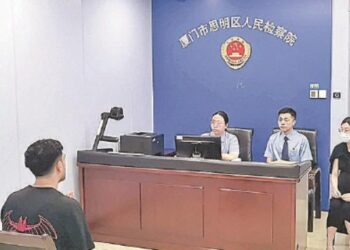
Shortly after the Dragon Boat Festival, Mr. Wang, a Singaporean businessman, rushed to the command center of the Hangzhou Public Security Bureau, insisting he wanted to surrender to “Officer Han Zheng from the Hangzhou Public Security Bureau’s Criminal Investigation Unit.” After officers from the Hangzhou Anti-Fraud Center helped him analyze the situation, Mr. Wang let out a bitter laugh and said, “It was like a nightmare—an elaborate scam within a scam!”
The ordeal began in late March when Mr. Wang received a call from someone claiming to be a “China Mobile account manager.” The caller accused him of registering a SIM card at Hangzhou Xiaoshan International Airport and spreading false investment and financial information. Though Mr. Wang, a frequent traveler to cities like Shanghai and Beijing for his foreign trade business, was certain he had never been to Hangzhou, the caller insisted he report the matter to the local police. When Mr. Wang explained he was too busy to travel, the “China Mobile manager” promptly transferred his call to the “Hangzhou police.” Within seconds, the line connected.
“This is the Economic Crime Unit of the Hangzhou Public Security Bureau. You need to provide proof that the SIM card wasn’t used by you. We also have additional information to verify. If you can’t come in person, we can conduct a video conference.”
Under the scammers’ guidance, Mr. Wang downloaded Zoom and joined the call to cooperate with the investigation. During the questioning, they claimed not only that his passport had issues but also that his bank accounts in Hangzhou were problematic, labeling him a suspect in a criminal case. They demanded he keep Zoom running at all times so they could monitor his movements. Though skeptical, Mr. Wang complied as they warned that legal proceedings would begin and his bank cards would be frozen. To his shock, his accounts were indeed frozen soon after, convincing him of their supposed legitimacy.
The scammers then claimed they needed to audit his bank accounts to verify the legitimacy of his funds. They said officers from Singapore’s Corrupt Practices Investigation Bureau (CPIB) would visit him to conduct the inspection. At a location Mr. Wang designated—and under the watch of surveillance cameras—the “officers” flashed credentials and collected 150,000 Singapore dollars in cash, which he had prepared to “prove his innocence.” Over the next month, the fraudsters returned three more times, using both cash pickups and bank transfers, ultimately swindling nearly 300,000 Singapore dollars from him.
“The last time they contacted me, they told me to come to the Hangzhou Public Security Bureau’s Criminal Investigation Division for further questioning. So I flew here!” Mr. Wang purchased a ticket from Singapore to Hangzhou, only to realize he had been scammed when he sat across from real police officers. It was the officers of the Hangzhou Anti-Fraud Center who exposed the truth. While there have been cases of fraud victims traveling to Hangzhou to verify their situation, this was the first instance of a foreigner flying in from overseas after being duped.
The Hangzhou Anti-Fraud Center issued a stern alert to citizens and overseas Chinese: Chinese police, prosecutors, or courts will never issue arrest warrants or legal documents via WeChat, QQ, or video calls, and terms like “Proof of Financial Strength” do not exist in legal procedures. Authorities will never ask individuals to withdraw cash or purchase gold for “verification.” Any demand for money transfers under the guise of “verification” is a scam. If someone claiming to be law enforcement contacts you, always verify with your local authorities—and if you realize you’ve been scammed, report it immediately.






